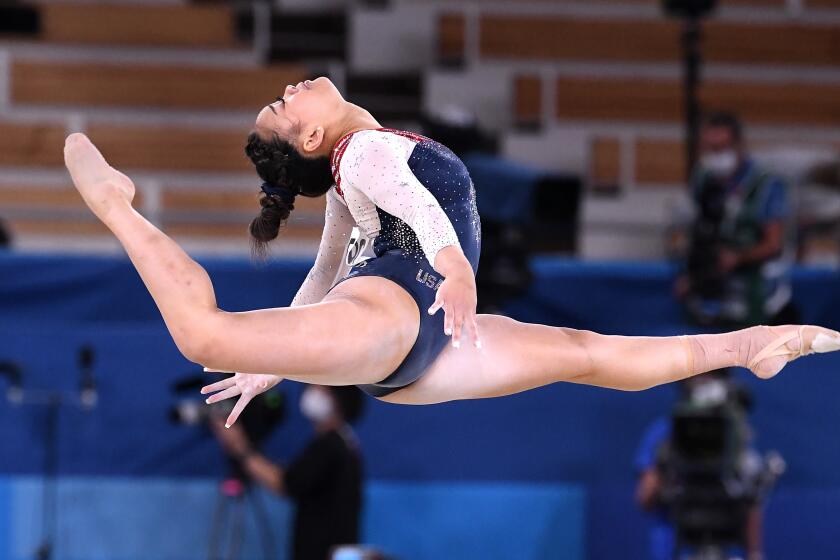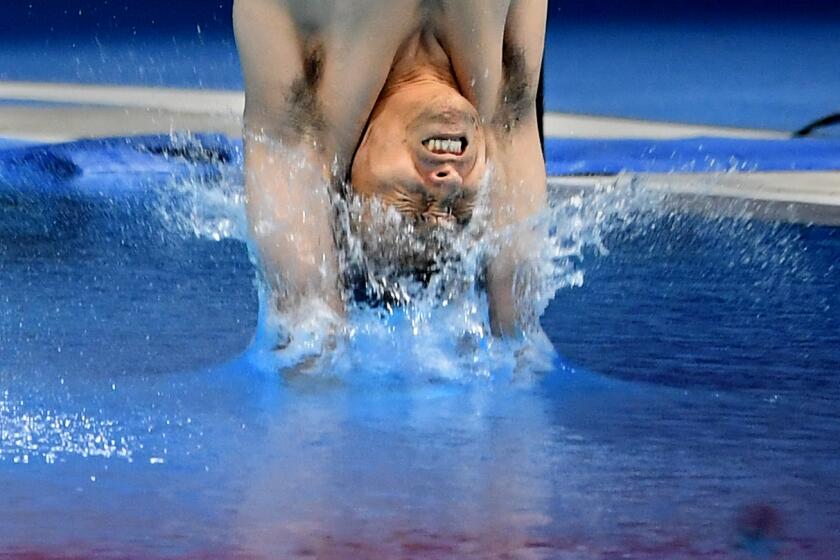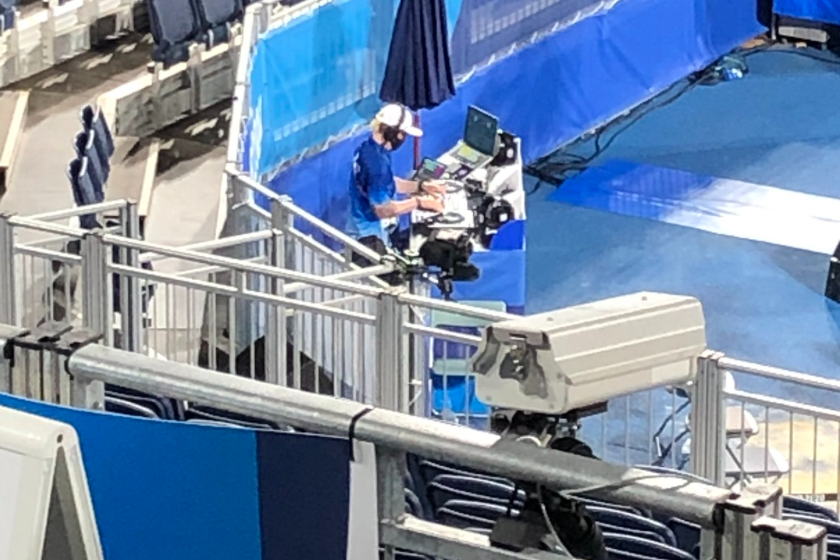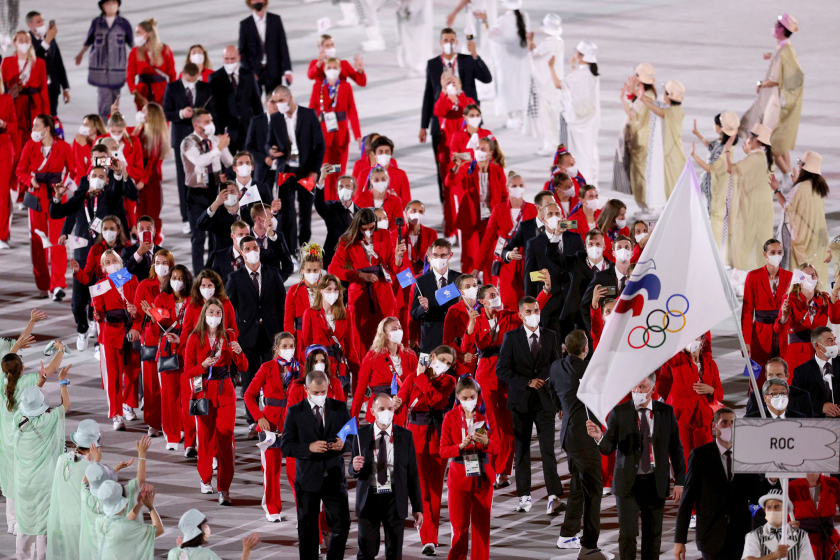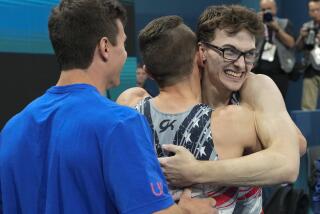Isaiah Jewett embraces his inner superhero in quest to conquer Olympic 800 meters
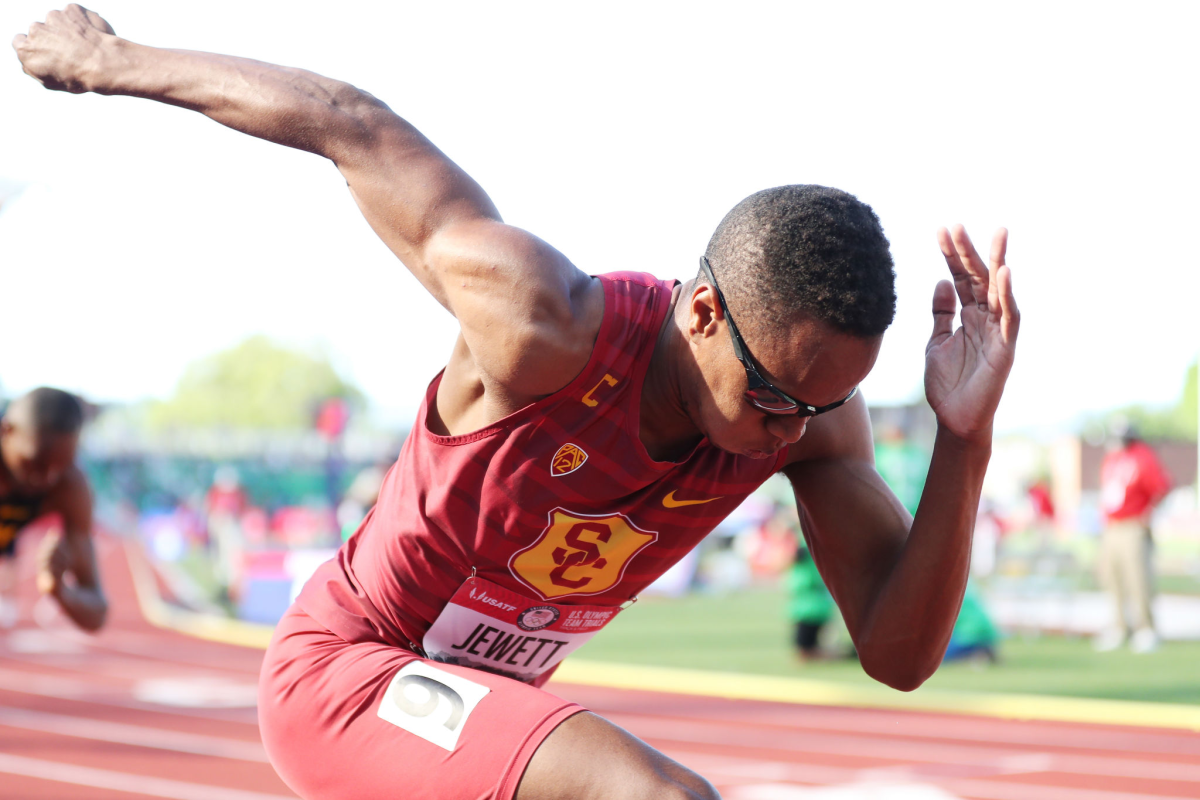
- Share via
TOKYO — The plan, as Isaiah Jewett envisioned it, lined up perfect.
Make the U.S. Olympic team. Compete for a gold medal in the 800 meters. And, as if he needed any more motivation, spend a few heavenly days in Tokyo’s Akihabara district, the center of the anime universe.
Jewett learned to read by combing through manga, Japanese comics. He overcame self-doubt and gained confidence by obsessively watching anime, Japanese cartoons.
Consider: At the U.S. Olympic trials in June, Jewett ran the last 250 meters imagining he was an anime character carrying a companion through a tunnel to safety.
“These shows just inspired me to keep moving forward,” he said this month before leaving for Tokyo.
U.S. gymnast Suni Lee won the all-around gold medal at the Tokyo Olympics, taking the lead after the third of four rotations.
On Saturday, Jewett’s gold-medal quest begins at Olympic Stadium with the preliminary rounds of the 800 meters.
The 24-year-old Inglewood native and NCAA champion from USC will don the trademark sunglasses that help him cope with a vision issue, and he will attempt to become the first American to win a gold medal in the 800 since Dave Wottle in 1972.
Jewett looked forward to exploring the sights, sounds and shops of Akihabara that are all things anime. But with much of Japan in a state of emergency because of the coronavirus, athletes are restricted to the Olympic village. They arrive a few days before their competition begins and must depart 48 hours after it is completed.
A visit to Akihabara seems unlikely. The situation has dampened neither Jewett’s enthusiasm nor his desire to become an Olympic champion and inspirational superhero.
“If this isn’t it for me,” he said, “I don’t know what is.”
===
Venus Jewett was a college sprinter, and she coached Pepperdine among various competitive levels. The Olympics were never far from her mind.
She named her oldest daughter Victorya, the next oldest Olympia. She gave her youngest son, Isaiah, an equally strong middle name: Champion.
“I knew someone would make it,” she said, laughing heartily. “He’s my last hope! Olympians are an elite circle, and I wanted in that circle.”
Isaiah’s road was tougher than most. Born premature, he battled for weeks to stay alive. As he got older, he did not develop as quickly as his siblings or other kids his age.
Jewett was cut from basketball teams. He lost most of his running races.
“The boy was slow,” Victorya said. “The boy was slow as dirt.”
Jewett focused on a modest goal: keeping up with older brother Robert and his sisters, and perhaps doing them one better.
“I would watch these cartoons and they would make me feel like I could become a superhero.”
— Isaiah Jewett
“That was the initial start to my Olympics dream,” he said. “Just wanting to beat my sisters in something.”
For inspiration, Jewett lost himself in cartoons.
His reading and overall confidence improved by voraciously powering through Japanese comic books — “We were at Barnes & Noble so much, I think they took the chairs out because of us,” his mother said — and he could not get enough of anime television shows such as “Naruto,” “Haikyu!!,” “Beyblade” and “My Hero Academia.” If the characters could overcome obstacles and learn valuable life lessons, so could he.
“I would watch these cartoons and they would make me feel like I could become a superhero,” he said. “Cartoons are the reason why I kept running. It’s the reason why I kept going, even though I was losing all the time. I just kept going because I had these shows.”
===
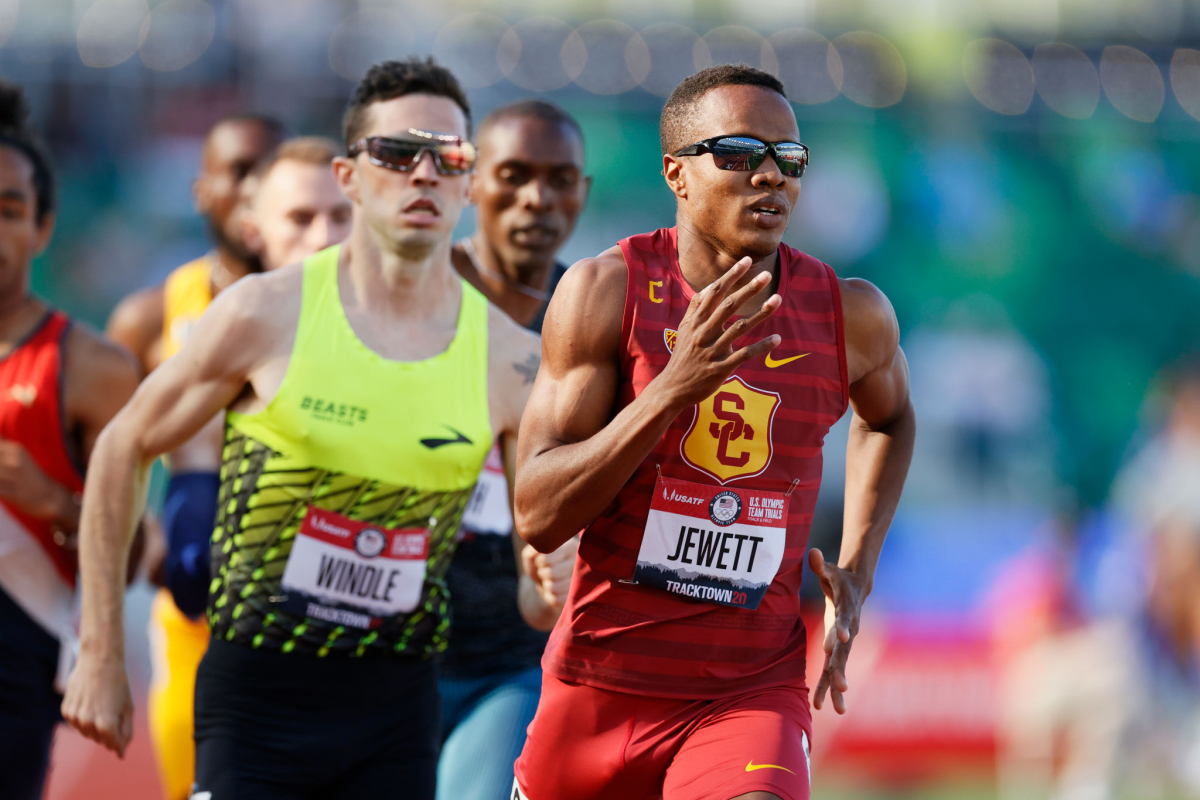
Jewett attended Culver City High for a year before transferring to Los Angeles Cathedral. It was there that Jewett first wore sunglasses while running.
Born with a condition that made one eye weaker than the other, he also experiences sensitivity to light that causes debilitating migraines.
When Jewett was a child, his mother tried to make him wear glasses or a patch. But he would have none of it.
“I have one picture of him in some glasses following doctor’s orders,” his mother said, “and he wouldn’t do it after that.”
The condition made it tough at times on the track because Jewett’s vision blurred during races. Not knowing if someone was passing him, he listened for their breath.
At Cathedral, a coach gave him sunglasses.
Olympic divers experience many of the same injuries that affect athletes of more traditional contact sports, and the pain begins before they hit the water.
“Once he put those glasses on, you saw another change, another level of confidence,” his mother said. “It was like taking the blinders off and putting the glasses on.”
Jewett earned an opportunity to run in college at UC Irvine. After two years, he transferred to USC and eventually blossomed into a 2021 national champion, winning the 800-meter title in June and then finishing second at the Olympic trials a week later.
“Once I get to the last 200, I’m really working hard,” he said. “But with my glasses, it keeps me calm and collected.”
Plus, there is another benefit for an aspiring superhero.
“It makes me look cool,” he said.
===
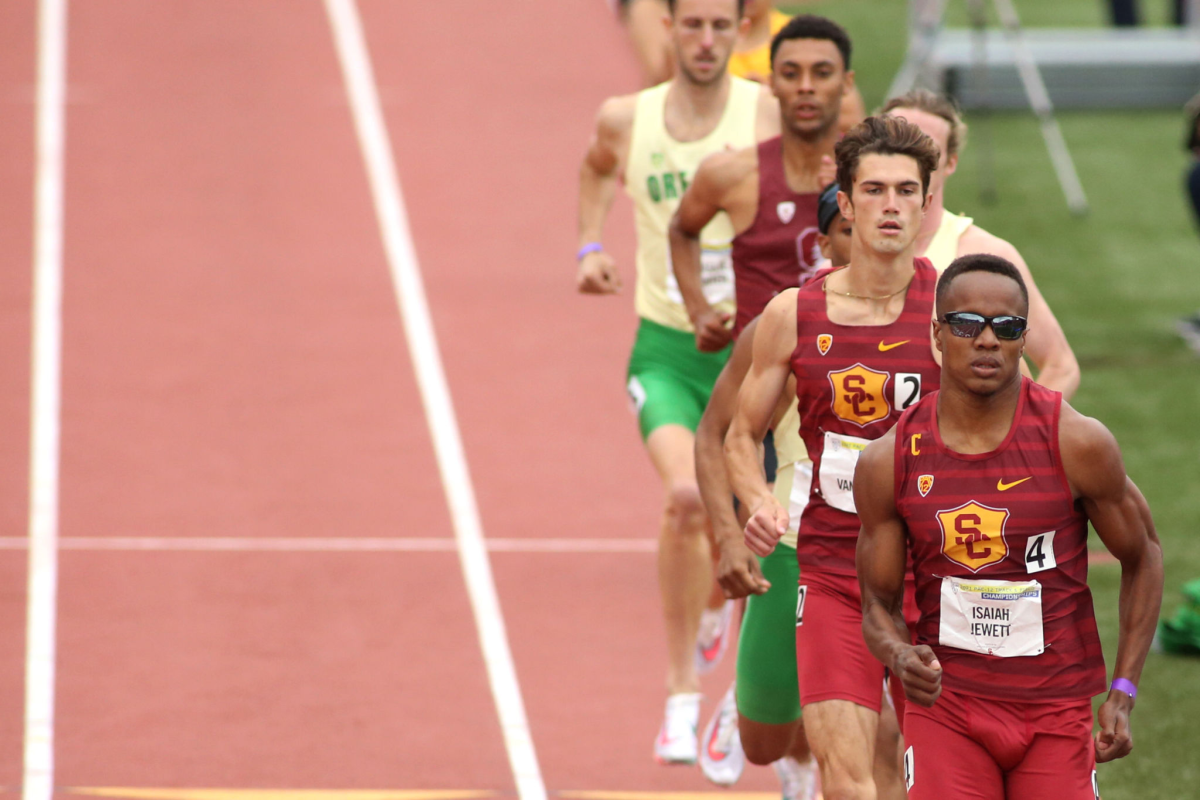
Jewett concluded his 2020 college season with school-record times, but only after a slow start with a new assistant coach. Last October, Jebreh Harris replaced Patrick Henner on USC’s staff.
“I was so upset, I was so mad, I didn’t give coach Harris the time of day,” Jewett said.
Said Harris: “He resisted pretty good. But I just reminded him, ‘I’m not taking anything personal,’ and I just respect his position.”
One day, during a particularly difficult workout, everything changed. Jewett had a bad rep. He anticipated being called out.
“On the line,” Harris said, calmly.
Another bad rep. Then another.
“On the line,” Harris said each time.
“It eventually came to the point where he was like, ‘I’m never going to abandon you if something goes wrong, I’m still going to be there,’” Jewett said. “‘Whether it’s pretty or bad, I’m still going to be there for you and I’m going to push you to become who you want to be.’”
DJ Roueche, the Lakers’ in-game DJ, is finding ways to pump up beach volleyball athletes through sound at the crowd-free Tokyo Olympics.
Coaching the physical aspects of sports is the easy part, Harris said. Connecting with individuals is the challenge.
“You have to show that you care,” he said. “You’ve got to show that you have their back, and you do that through action.”
Jewett and Harris also bonded over anime.
Harris studied Japanese in high school. He had Jewett read “The Book of Five Rings,” by Japanese swordsman and philosopher Miyamoto Musashi.
Their conversations about anime are a mix of old and new. Harris grew up with “Dragon Ball” and “Robotech.”
“If he’s weird, I’m weird too,” Harris said, “So, there’s no issue there.”
===
Jewett’s run to Tokyo began with a record-setting performance at the annual USC-UCLA dual meet in May. He won in 1 minute, 45.80 seconds, the fastest time in a dual-meet competition in NCAA history.
Olympia, UCLA’s director of operations for track and field, cheered him on.
“Everyone at UCLA knows this: I am Isaiah’s older sister first and then I am UCLA’s director of operations,” she said. “If Isaiah is on the track, I will put on a USC shirt and I will scream my head off until he crosses that line. And then I’ll take it off and go back to work.”
In June, at the NCAA championships in Eugene, Ore., Jewett lowered his personal best to 1:44.68, becoming the first Trojan to win the event.
A week later, he was back in Eugene for the Olympic trials. He also had a 10-page paper due for a master’s degree program in project management.
“I tried to write something and all I wrote was ‘Olympic trials. Olympic trials. Olympic trials,’’’ he said. “And I was like, ‘OK, that’s not getting me anywhere.’”
American record-holder Donovan Brazier was favored in the final, but Jewett went out fast and finished second behind 2016 bronze medalist Clayton Murphy in a personal-best 1:43.85. He also finished his paper.
Jewett said he was inspired in part by the memory of his brother Robert, who died in an auto accident eight years earlier. He was 27.
“That man was fearless,” Jewett said, recalling how Robert never shied from being himself or boisterously showing his support, even when decorum called for silence.
Jewett’s mother and sisters said Robert’s death caused Isaiah to mature from child to man.
“He always wanted his brother’s approval,” Venus Jewett said. “I think in a way he’s thinking, ‘My big brother would like this.’
“It’s like he has an angel watching him and the love never goes away.”
===
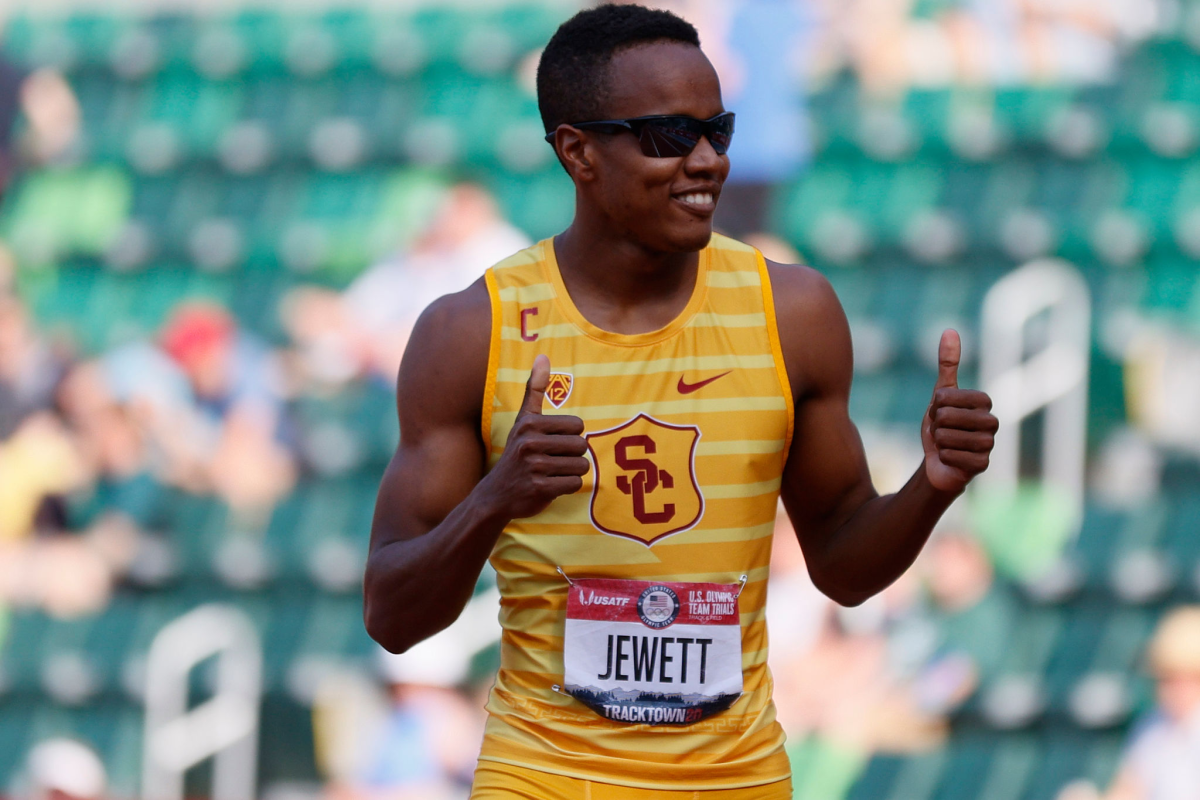
When Olympic officials in Japan announced that spectators would not be allowed to attend events in Tokyo, Jewett’s mother scrapped plans for the family to stay in a friend’s Tokyo apartment.
“He’s like, ‘Unless you guys are going to go and find me some anime, don’t go,’” she said, laughing.
So Jewett’s family and his girlfriend, former UCLA long jumper Jazmin Moss, will watch from home.
“I’m probably just going to cry the whole time that he’s running because this is everything he’s worked for,” Olympia Jewett said. “It’s going to be a crazy feeling to watch him, definitely emotional.”
Said Victorya: “Don’t underestimate him. That will be your downfall.”
Win or lose, Jewett plans to enjoy the moment.
What the heck is the ROC? Well, it’s Russian athletes in every aspect except a flag and anthem. Here’s why the name is being used at the Tokyo Olympics.
“It would mean the world if I won the gold,” he said. “Either way, you’re going to get a fight out of me. You’re going to get all that I have.”
When the Olympics are over, Jewett plans to finish his master’s. He also is minoring in animation.
His goal is to create his own anime. He already has developed characters that can reach “the not-the-fastest kid, the nerdy kid and geek-type kids,” he said.
“To inspire the next generation,” he said, “the way anime and cartoons inspired me.”
More to Read
Go beyond the scoreboard
Get the latest on L.A.'s teams in the daily Sports Report newsletter.
You may occasionally receive promotional content from the Los Angeles Times.

